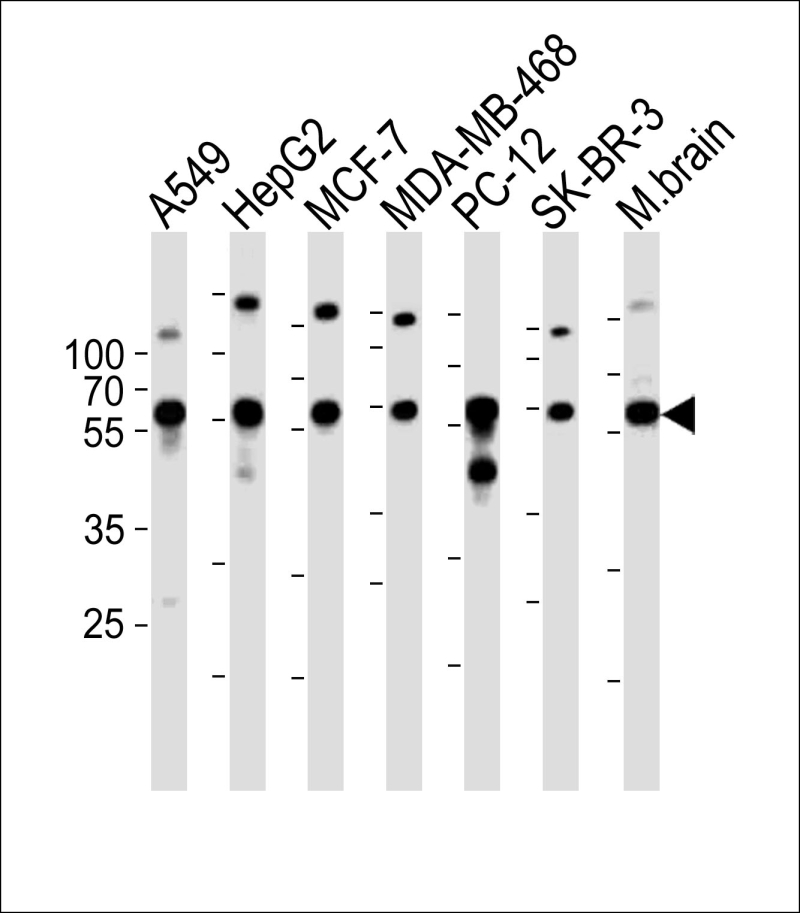
| WB | 1/1000 | Human,Mouse,Rat |
| IF | 咨询技术 | Human,Mouse,Rat |
| IHC | 咨询技术 | Human,Mouse,Rat |
| ICC | 技术咨询 | Human,Mouse,Rat |
| FCM | 咨询技术 | Human,Mouse,Rat |
| Elisa | 咨询技术 | Human,Mouse,Rat |
| Aliases | Plasminogen activator inhibitor 1 RNA-binding protein, PAI1 RNA-binding protein 1, PAI-RBP1, SERPINE1 mRNA-binding protein 1, SERBP1, PAIRBP1 |
| Entrez GeneID | 26135 |
| WB Predicted band size | 45.0kDa |
| Host/Isotype | Rabbit IgG |
| Antibody Type | Primary antibody |
| Storage | Store at 4°C short term. Aliquot and store at -20°C long term. Avoid freeze/thaw cycles. |
| Species Reactivity | Human, Mouse, Rat |
| Immunogen | This SERBP1 antibody is generated from a rabbit immunized with a KLH conjugated synthetic peptide between 149-183 amino acids from the Central region of human SERBP1. |
+ +
以下是关于SERBP1抗体的3篇参考文献及其摘要内容的简要概述:
---
1. **文献名称**:*SERBP1 modulates glioblastoma cell proliferation via regulation of mRNA stability*
**作者**:Garncarz, W., et al. (2018)
**摘要**:该研究利用SERBP1抗体进行免疫沉淀和Western blot分析,发现SERBP1通过稳定促癌相关mRNA(如VEGFA)增强胶质母细胞瘤细胞的增殖和侵袭能力,提示其作为潜在治疗靶点。
---
2. **文献名称**:*SERBP1 as a prognostic biomarker in ovarian cancer: Insights from immunohistochemical analysis*
**作者**:Zhang, L., et al. (2020)
**摘要**:通过SERBP1抗体进行组织染色,研究发现SERBP1在卵巢癌组织中高表达,且与患者不良预后显著相关,表明其可能作为卵巢癌诊断和预后评估的生物标志物。
---
3. **文献名称**:*SERBP1 regulates RNA metabolism and stress granule dynamics in cancer cells*
**作者**:Huang, Y., et al. (2019)
**摘要**:利用SERBP1抗体进行免疫荧光和共定位实验,揭示SERBP1通过参与应激颗粒的形成调控肿瘤细胞在缺氧环境中的存活,其缺失导致RNA代谢异常和细胞死亡增加。
---
这些文献涵盖了SERBP1抗体在功能研究、临床预后及分子机制中的应用。如需具体文献链接或补充,建议通过PubMed或Google Scholar检索标题及作者获取全文。
SERBP1 (SERPINE1 mRNA-binding protein 1), also known as PAI-RBP1. is an RNA-binding protein that regulates the stability and translation of SERPINE1/PAI-1 mRNA, a key player in fibrinolysis, cellular stress responses, and cancer progression. SERBP1 is ubiquitously expressed and primarily localizes to the cytoplasm, where it interacts with target mRNAs to modulate their post-transcriptional regulation. It has been implicated in diverse cellular processes, including hypoxia adaptation, apoptosis, and cell proliferation. Dysregulation of SERBP1 is linked to tumorigenesis, particularly in glioblastoma, ovarian cancer, and colorectal cancer, where it often correlates with poor prognosis.
SERBP1 antibodies are essential tools for studying its expression, localization, and molecular interactions. These antibodies are widely used in techniques such as Western blotting, immunohistochemistry (IHC), immunofluorescence (IF), and immunoprecipitation (IP). Polyclonal and monoclonal antibodies targeting specific epitopes of SERBP1 are commercially available, often validated for specificity using knockdown or knockout controls. Researchers utilize these antibodies to investigate SERBP1's role in stress granule formation, mRNA metabolism, and oncogenic pathways. Additionally, they aid in exploring SERBP1's potential as a therapeutic target or biomarker in diseases like cancer and vascular disorders. Proper validation, including cross-reactivity checks and functional assays, is critical for ensuring antibody reliability in experimental settings.
×